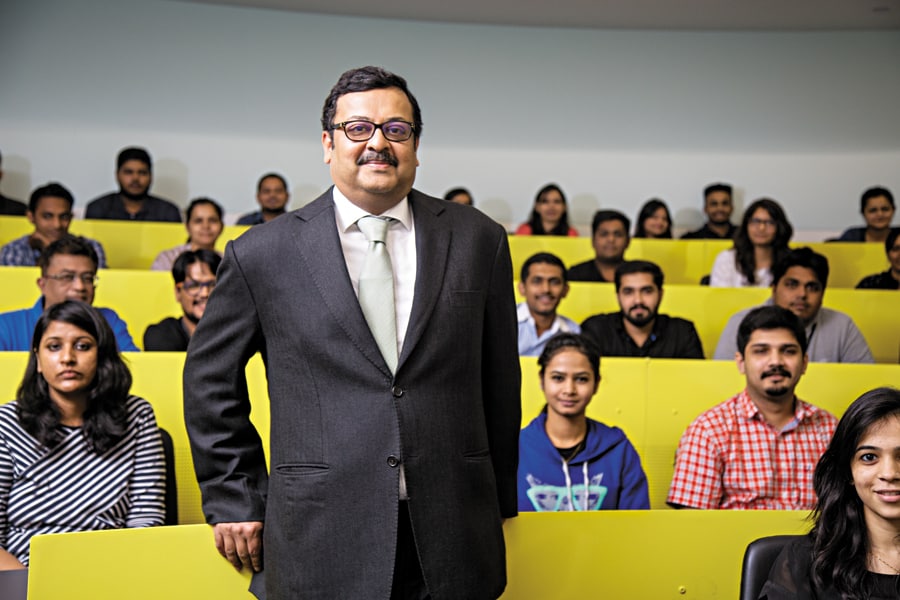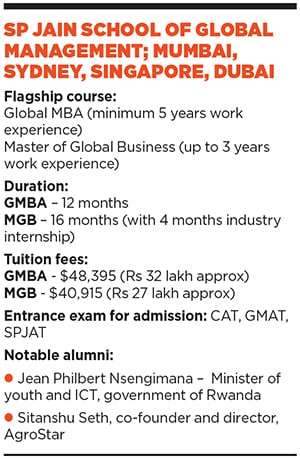SP Jain School's do-it-yourself MBA
SP Jain School of Global Management has crafted an MBA programme where corporate finance is as important as cultural connect


A key highlight of the global MBA programme administered by the SP Jain School of Global Management is a trip to the headquarters of Emirates, one of the world’s most profitable and luxurious airlines, in Dubai. Students are taken inside a mock A380 aircraft and, in a simulated environment, exposed to the challenges of serving guests in the sky.
That the students are being trained to be professional business leaders, and not airline stewards, appears a rather strange exercise. But the institute’s president Nitish Jain explains that managing customer experience in a constrained environment (such as in an aircraft, 35,000 feet above sea level) is a valuable lesson that can be applied in any other business context.
This, in a sense, is at the core of the management education philosophy at SP Jain, which has three global campuses—in Sydney, Singapore and Dubai—besides two in Mumbai.
Such a philosophy recognises that, as businesses go increasingly global, management talent also needs to have a global orientation. At SP Jain, students are not only taught formal theories, but also ways to dine while sitting on the floor (like the Arabs do) and eat with chopsticks (like the Chinese) so that they are capable of establishing a cultural connect with people around the world.
Second, SP Jain, whose one-year international MBA programme has been ranked tenth best in the world by Forbes, seeks to replace the “sage-on-a-stage” teaching model, where an instructor delivers a lecture from a podium, with a “do-it-yourself” approach to learning, which relies heavily on the use of simulated business environments that call upon students to take swift business decisions.
This new approach, including the use of technology, has not only attracted students, but also some of the best professionals in the world, to SP Jain. Julian Persaud, regional director for the Asia Pacific region at Airbnb, has been on the advisory board of the institute for the last three years. “What drew me to SP Jain is the digital transformation in management education that it seeks to bring about and the personal links with the industry that it has established. This is in step with the transformation that is taking place at businesses globally,” says Persaud.
“Learning management is like diving a car. No matter how good the instructor is, one cannot learn to drive in a classroom,” says Jain, who has first-hand knowledge of the kind of talent that businesses need, having built and sold a sizeable business (that of selling food products like flour and salt under the ‘Captain Cook’ brand). Students at SP Jain have to complete as many as 40 to 50 simulation exercises through the academic year.
These learning techniques and management tools in operational areas such as corporate finance and marketing have helped make Yogesh Rao, 39, a whole-rounded professional, he feels. Rao is a solutions leader at Hewlett-Packard Enterprise in Mumbai. After seven-and-a-half years of work experience in the IT industry across countries like the US and Singapore, Rao decided to pursue SP Jain’s global MBA programme, from which he graduated in 2008. “Business intelligence and analytics had always been my core forte. But it is the essential management tools across functions like corporate finance and marketing that have prepared me to take on senior leadership roles,” Rao says.  Image: Joshua Navalkar
Image: Joshua Navalkar
Nitish Jain,president, SP Jain School of Global Management
Another interesting concept at SP Jain is that of ‘student boardrooms’, where students are taught the “SP Jain technique” of taking decisions and are asked to put this knowledge to practical use by solving a challenge through a business decision taken in a boardroom-like setup. The process that students follow and the final outcome is then evaluated in a group discussion and is thrown open to be challenged by other student groups. “The idea is to make students far more seasoned in decision-making,” says Jain. Among the other soft skills that students imbibe is the ability to interact with a diverse set of people. The school’s two flagship programmes, MGB (Master of Global Business) and GMBA (Global MBA) admit 400 students per year.
Karan Badami, 25, who is a part of SP Jain’s latest batch of MGB programme, is working in Dubai as a business analyst with Thomson Reuters’ new business team. “The learning experience at SP Jain and interacting with students from all over the world changes your outlook towards life,” he says.
Conscious of the fact that traditional MBA degrees of yore were designed to cater largely to students from an engineering background, SP Jain tries to restrict the proportion of engineers to its overall student mix to half. The remaining half of the class is sourced from professionals who have a background in business, law, fashion designing, merchant navy, or even medicine. The institute is also addressing the need for specific short-term courses targeted to impart new-age skills for business in the digital age.
These courses, which have an average duration of six months, include subjects such as big data and analytics, luxury management, and digital marketing.
SP Jain has also started a new institute, the SP Jain Institute of High Technology in Mumbai, which offers courses in highly specialised areas, including Artificial Intelligence, Internet of Things, virtual reality and machine learning. “This is the future,” Jain says. “Business is not just about management education any longer.”
First Published: Oct 24, 2016, 06:10
Subscribe Now